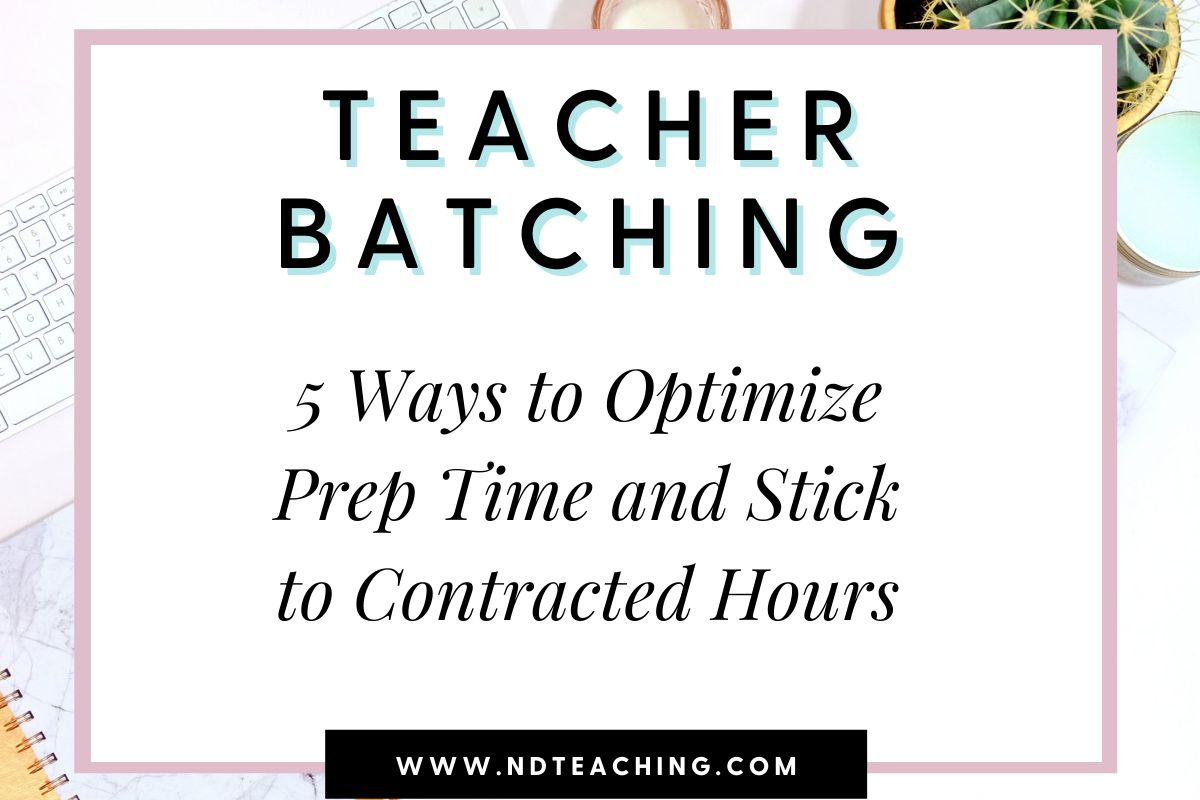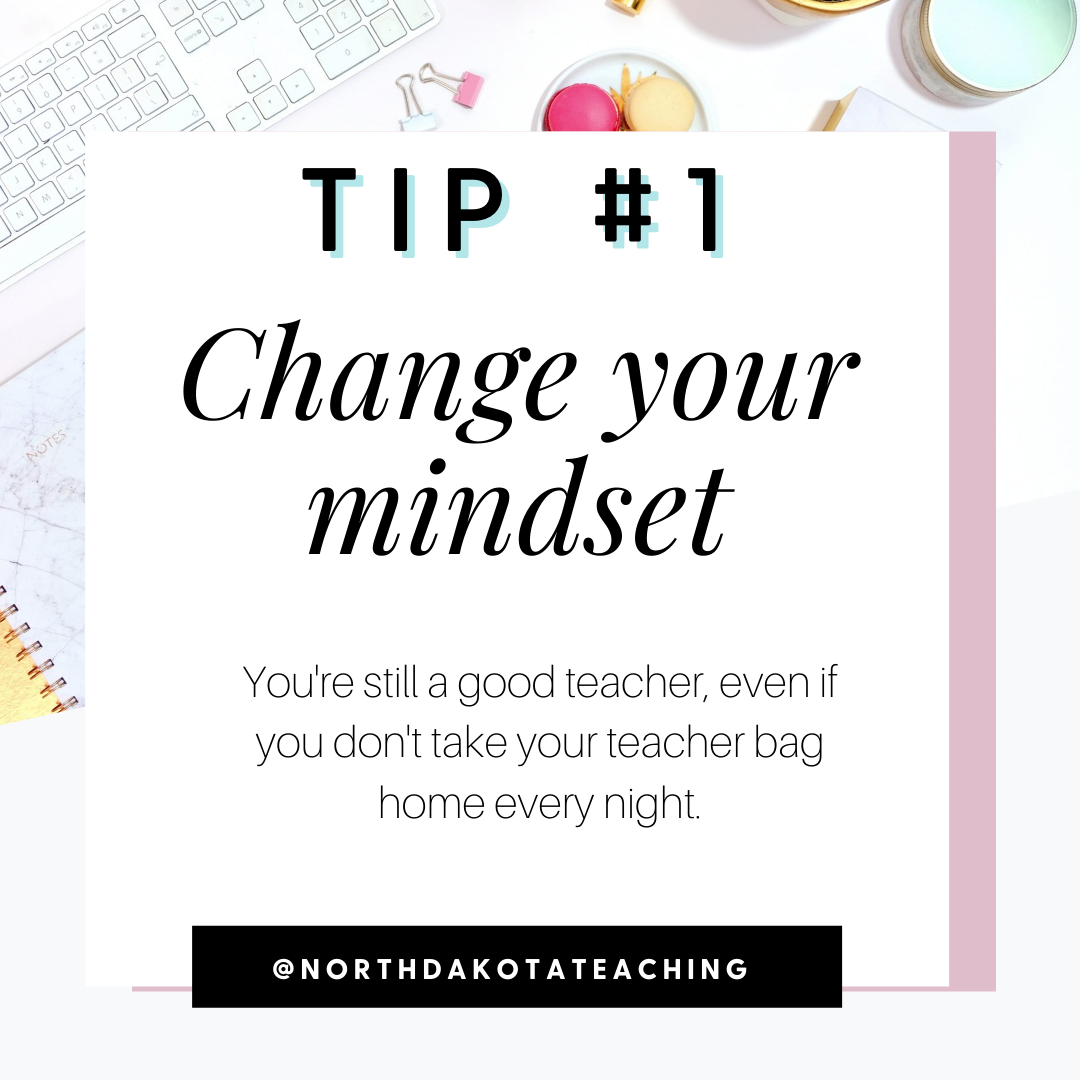Teacher Batching: 5 Ways to Optimize Prep Time and Stick to Contracted Hours
Stream Episode 49 on the Let’s Talk Teaching Podcast to hear more ways to optimize your prep time and stick to contracted hours!
Today I am hoping to make all of your teacher dreams come true by sharing simple tips you can use that will help you optimize your prep time and stick to your contracted hours. As a teacher, we want to do all the things and we all know that just because we aren’t physically at school, doesn’t mean we aren’t thinking of school. From lesson plans to grading, to thinking about our students, our minds are always on teaching, especially as a first or second-year teacher. These 5 tips will teach you a simple way to organize your life and how to be better with time management so you can live your best life, both in the classroom and outside of school.
How it Started
When I first started teaching, teaching was my life. It’s just what I did. I was a teacher. It was who I was. It defined me as a person. Teaching was my whole world. From going in early every single morning to staying late every single night, plus going to my classroom every single Sunday after church, it consumed me.
Now, I really don’t want you to take this negatively, because it truly did consume me in all the best ways. Although I was spending 50-60 hours per week working, I loved it and wouldn’t have changed a thing about it. However, that first year of teaching, I was single as a Pringle and teaching was my sole purpose in life. I guess you could call this some of the single-life advantages! Sure, I enjoyed seeing friends on the weekend, but my coworkers quickly became my closest friends, so I wasn’t really rushing to meet anyone after school, because everyone I was going to see was already at the school with me. I also enjoyed working out, but at the same time, I was getting 10,000 steps every single day in my classroom. If I missed a workout here or there, no big deal.
What I’m getting at is, you already know that I had zero systems or processes in place that would help make my life easier my first year of teaching, but it didn’t really matter because everything I wanted to do revolved around teaching. I wasn’t sitting around thinking single life was boring because I was spending all of my time in my classroom, doing exactly what I loved!
Improving Time Management
It wasn’t until the end of my first year of teaching that Brent came into my life, but even then, Brent respected the hours that I was investing in my classroom. He knew how important my students were to me and he never wanted to come between me and school. Our relationship was so new, so any time I texted to say I was staying late or wouldn’t be able to meet up that night, it just wasn’t really that big of a deal. However, our relationship progressed pretty quickly over the summer, and by December we were engaged and married six months later. With all of that, my passion for teaching was still on fire, but my purpose in life started to shift a bit.
That second year of teaching showed me that I could still be the teacher my students needed me to be, but I needed to prioritize what was and wasn’t important. I needed to get rid of the fluff and the busy work and start prioritizing my time. It was time for me to see some major time management improvement.
I always say that you’re a person first and a teacher second.. and that’s what today’s post is all about. It’s okay for teaching to be your passion, but I want you to have other passions in life too. If you’re a first-year teacher reading this right now and your first year of teaching sounds a lot like mine, that’s okay! If you’ve been teaching for a while and you’re okay with your time being solely devoted to your students and your classroom, that’s okay too.
However, if you’re ready to begin remembering who you are as a person outside of the classroom, then you’re in the right place. For me, it was when I began stepping into my role as a fiancé, that I realized the way I was doing business just wasn’t sustainable. I didn’t want my future husband to wonder if I was going to make it home for supper that night. I didn’t want Brent to feel like he came second in my life. But, you have to remember that I had to make this choice. I had to first accept that I was going to start putting systems in place that would allow me to have my free time back, but then I actually had to start executing my plan. That meant less time wandering the halls and checking the staff room for a mid-afternoon treat and more time sticking to my to-do list. It also meant less time chatting with my coworkers before school, during my prep, and after school. I had to really start using the time I was being given wisely so that I wouldn’t have to spend as much time doing things later.
Changing my habits
Now I need you to know, these things did not happen overnight. I didn’t just wake up one day and from that point forward I used all of my prep time wisely. Not even close. There were still days I just couldn’t even think about doing one more thing. There were also days that I spent my prep time scrolling social media because that’s just all I could handle that day. I am human too. There were even nights that I brought things home, stayed late here or there, or went in on the weekend. However, what I want you to hear me say right now is that the extra time I was spending eventually became a choice, not a necessity. I was choosing to go above and beyond in my planning or to go in and get things organized for the week ahead. I no longer felt like I had to.
So let’s get into the nitty-gritty of things — How did I go from spending an extra 10-20 hours a week in my classroom, to sticking to my contract hours?
Tip #1 Change Your Mindset
Well, first things first - tip number 1 is all about mindset and manifestation. I had to accept that I was still a good teacher even if I didn’t take my teaching bag home every night. I had to accept that I was a person first, and a teacher second. I had to start prioritizing myself again and remember the things I enjoyed doing in my free time before I became a teacher. Going to the gym, spending time outside, cooking a real meal for supper, and not just having a microwave dinner every single night. Honestly, at first, it was really hard. As a teacher, there is always so much more we can be doing, but I had to accept that there was just no way possible that the work as a teacher would ever be done. We have to set boundaries and we have to draw a line.
Tip #2 Work Smarter Not Harder
As teachers, we know the importance of lesson planning. We know we need to keep things fun and engaging. We know there are so many awesome activities out there that our students will love. However, that doesn’t mean we need to try to do every single cool, new activity every single day. Instead of trying to do 10 million different activities with my students each week, which often caused confusion and management issues, I decided to have my students do the same types of activities for a few weeks at a time, with just a slight variation each week that went along with our target standards, vocab words, etc. Then, after a few weeks, we would change things up, introduce new activities, and they would then do those same activities for the next two, three, four weeks. This really helped my students with independence, and our classroom management during small groups got better and better each week because my students knew what was expected of them and they felt confident and capable in the activities they were doing.
For example:
Monday’s Word Work and Work on Writing were always the same types of activity every week.
Tuesday’s Word Work and Work on Writing were always the same types of activity every week.
Guess what, Wednesday’s, and Thursday’s, and Friday’s Word Work and Work on Writing were always the same type of activities each week.
After a few weeks, I would begin switching out one of two activities at a time to keep things fun and fresh, but it wasn’t so often that it caused confusion or not often enough which could lead to a lack of participation or boredom.
By finding consistency in the activities we were doing, my planning got easier and classroom management improved. Definitely a win-win situation!
Tip #3 Batch your lesson planning
Once I started choosing activities that I knew were going to work for a few weeks at a time, I realized I could start batching my lesson planning. For those who claim to not be good at time management, this is such a great solution! Batching, or Teacher Batching, are synonyms for time management systems. Batching means choosing one single focus per sitting when it comes to lesson planning and getting as many things ready for that given hour or subject at a time. As an elementary teacher, this happened subject by subject.
I know this is going to shock everyone, but the very first subject I ever mapped out was science. After our first two units, I started to see consistency in the curriculum and I took advantage of that. I will never forget having all of the materials spread out on my classroom floor as I mapped out and prepped my entire science unit all at one time. Every activity, every lesson, every resource that I needed for the next month or so was completely ready to go!
After doing it once, I was so pumped to try it again!
So guess what I mapped out next? Yep, I knew you knew it, social studies! I planned out our entire homestead project, every rubric, every checkpoint, every resource my students would need.. and then for the next month, I didn’t have to do any social studies or science planning. And then, this is where it hit me, I realized I could map out every subject. For the rest of the year.
Up until this point, I was surviving day by day in math since we didn’t have a curriculum. Once I started to begin with the end in mind, (Steven Covey: 7 Habits of Highly Effective People) I was able to map out entire units at one time, my definition of lesson planning changed, and everything in my life got easier!
*If you’re ready to learn how to map out your lesson plans, create a scope and sequence, and create a curriculum map aligned to your school calendar, be sure to check out this Curriculum Mapping Workshop. It’s #lifechanging!
Tip #4 Stop Trying to Do All the Things Every Single Day
Once I realized I could batch my lesson planning, I was hooked. This was the turning point for me. I finally realized that I do not have to do every single thing, every single day. It’s just not sustainable. I didn’t have time to plan my lesson every single day. I didn’t have time to make copies every single day. I didn’t have time to grade papers every single day. This goes back to tip number one where I said that I had to accept that the work would never be done and that it was my job to set the boundary and draw the line.
This is finally when I realized I truly could leave at my contracted time if I stuck to this single tip right here. I dedicated my prep time once a week to each important task.
The first one I started with was grading, especially once I began teaching 5 different math classes. I couldn’t physically keep up with the grading without losing my mind, so instead, I started to do all of my grading on Tuesdays. Why did I choose Tuesdays? At both schools I’ve worked at, they always pulled the eligibility reports on Wednesdays. I needed all of the grades to be in and updated by Wednesday morning anyway, so Tuesday became my day. For the most part, I could get all of my grading done if I used my time wisely on Tuesdays, but there were special occasions where I would take the grading home and finish it while I watched the Bachelor or Bachelorette, but usually, I was able to get it done within my contracted hours. (Stay tuned for more information on my grading organization! A new blog post and podcast will be coming soon! If you wanted to be reminded, be sure to join my email list!)
From there, each day of the week had one major priority for the day that I stuck to:
Miscellaneous Mondays: Catch up, emails, go through important documents, etc.
Grading Tuesdays: Grade every assignment from the previous week
Lesson planning Wednesdays: Batch your lesson planning by subject or unit!
Prepping Thursdays: Make all the copies and prep supplies for the following week
Finalize Fridays: Post lesson plans, organize the room, write up the next week's agenda, be sure everything is finalized and ready for Monday, etc.
Tip #5 Give Yourself Grace
If I could go back and do it all over again, I would have started with batching my lessons, but, you just don’t know what you don’t know. I didn’t have a reason to stick to my contracted hours. I didn’t have anyone to rush home to, not even a pet. What I want you to know though is that these things don't happen overnight. You don’t just magically wake up one day and have a curriculum map. You don’t just wake up one day and never stay past contract hour again. At the end of the day, we are humans first, and teachers second, but there still might be days that you do have to take those tests home to grade. However, my hope for you is that it starts to become a choice, not a necessity.
I want this for you so that your teaching career is sustainable; so that you can avoid the teacher burnout; so that you can remember your why, and so that you don’t always feel like you’re in survival mode. As you’re working toward making this change, remember to be kind to yourself! Make sure you are giving your best effort, but give yourself grace through the process.
So Let’s Do This!
If I can give you one starting point today, I would say first, set your intention. How bad do you want this? With everything, there is a sacrifice and anything worth having takes work. If you want to be able to leave at your contracted time, you’re going to have to really prioritize the time you have. Less time standing around chatting and more time working. You might have to close your door. You might have to ask your work besties to respect your prep time. Hey, it might even encourage them to start getting more work done on their preps too! Once you’ve set that intention, start choosing one thing you can focus on just one day a week. Start small. For the next few weeks, commit to just doing one thing once a week. Once you’re rocking it, add it to another thing. Who knows, by January you might be in full-on teacher batching mode!
As we end here today, know this — you are worth leaving your teacher bag at school. You are not less of a teacher if you do not stay late or go in on the weekends. You can still make an impact all while putting your health and your family first. Honestly, you’ll probably make an even bigger impact because you’ll be less stressed. Use these tips to optimize your prep time and stick to your contracted hours. As always, if you need anything at all, head on over to Instagram and send me a message, @mrskayladurkin.
Let’s Talk Teaching Podcast with Kayla Durkin
How do you feel about teacher podcasts? I’ll admit, I wasn’t super into them at first either. However, once I realized the impact they can make, I was hooked.
Sometimes, the best teacher PD we can receive comes from having conversations with other educators, which is what the Let’s Talk Teaching Podcast is all about!
And guess what, I release a new episode every Friday! Whether you’re driving to school, driving to the gym, or folding some laundry at home, if you’re looking for a new teacher podcast to listen to, this is surely one you do not want to miss!
WHAT’S HAPPENING ON INSTAGRAM? @mrskayladurkin
Come on over and say hey! 👋🏼 @northdakotateaching













